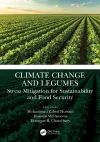
Climate Change and Legumes
3 contributors - Hardback
£100.00
M Zabed Hossain was born 1973 in Munshiganj, near to the capital city Dhaka, Bangladesh. After completion of his B.Sc. (Honors) and M. Sc. (with thesis) degrees from the Department of Botany, University of Dhaka he joined as a Lecturer and currently has been serving as Professor at the same department. He obtained his PhD from the United Graduate School of Agricultural Sciences (UGAS), Iwate University, Japan in 2007 and conducted post-doctoral research at Swedish University of Agricultural Sciences (SLU), Uppsala, Sweden during 2009 and 2011. He obtained several awards, including Guest Research Scholarship from Swedish Institute of the Swedish Government for post-doctoral research, Monbukagakusho Scholarship of the Government of Japan for PhD, National Science and Technology Fellowship from the Government of Bangladesh for MSc research, and International Centre for Genetic Engineering and Biotechnology (ICGEB) grant for attending training program in New Delhi, India. He has more than 20 years of experience in research and teaching on plant ecology, plant molecular ecology, ecosystem ecology and environmental science. His current research interests focus on adaptation of plants, ecology of invasive plants and plant-microbe interactions in relation to abiotic stresses such as salinity, drought, and heavy metals. He was awarded several research grants from national and international agencies including International Foundation for Science of Sweden, USAID-ILSI Research Foundation of USA, Ministry of Education, Ministry of Science and Technology and University Grants Commission of the Government of Banglades.
Dr Hossain Md Anawar obtained his MSc and PhD from Nagoya University and Niigata University, respectively, Japan. He recently worked as a research assistant at Science and Engineering Faculty, Queensland University of Technology (QUT), Australia. He has research experience in interdisciplinary fields including soil and plant nutrition, biogeochemistry, bioremediation, phytoremediation, and soil chemistry. He obtained nationally and internationally competitive scholarships, award and research grants in Japan, Spain, Portugal, South Africa, and Botswana. Through his scholarly, innovative, high-quality research works, he has established himself as a nationally and internationally recognized researcher in his field. He published 121 publications in peer-reviewed journals, book chapters and conference proceedings. Furthermore, he edited three books in Elsevier publisher and CRC press. His papers have Scopus citation record of 2019 with H-Index of 24. He has a Google scholar citation record of 3200 with H-Index of 25. He published research articles in high impactor journals such as Agriculture, Pedosphere, Environmental Pollution, Environment International, Chemosphere, Journal of Environmental Management, Science of the Total Environment, Talanta, Applied Geochemistry, etc. He was editorial board member, associate editor and guest editor of seven international journals including Agriculture (MDPI) 2020-2021, Pedosphere (Elsevier) and Physics and Chemistry of the Earth (Elsevier). He was an international expert to review the different national project proposals. He reviewed research articles from more than 15 international journals.
Doongar R. Chaudhary, was born (1973) at Jodhpur, Rajasthan India and studied soil science and agricultural chemistry at Rajasthan Agriculture University, Bikaner (campus: Udaipur), Rajasthan. He completed his PhD from ICAR-Indian Agricultural Research Institute, New Delhi in 2002. He started his research career from ICAR-Central Soil Salinity Research Institute, Karnal, Haryana and joined CSIR-Central Salt and Marine Chemicals Research Institute, Bhavnagar (Gujarat) in 2004. He is now working as principal scientist in the Division of Plant Omics. Dr. Chaudhary has been awarded BOYSCAST (2008-09) fellowship by Department of Science and Technology (GOI) and visited the School of Environment and Natural Resources, Ohio State University for one year. He has also been awarded Brainpool Fellowship-2015 of Korean Federation of Science and Technology (KOFST) at School of Civil and Environment Engineering, Yonsei University, Seoul, South Korea for 11 months. He has more than 20 years research experience in the field of soil fertility, plant nutrition and soil ecology. His current research interest is rehabilitation of coastal saline soil with halophytes, salt tolerant plant growth promoting rhizobacteria, metagenomics, soil microbial community, nutrient cycling, and biogeochemical processes in the coastal ecosystem. He is involved in the many projects funded by the CSIR, MoES and SERB.